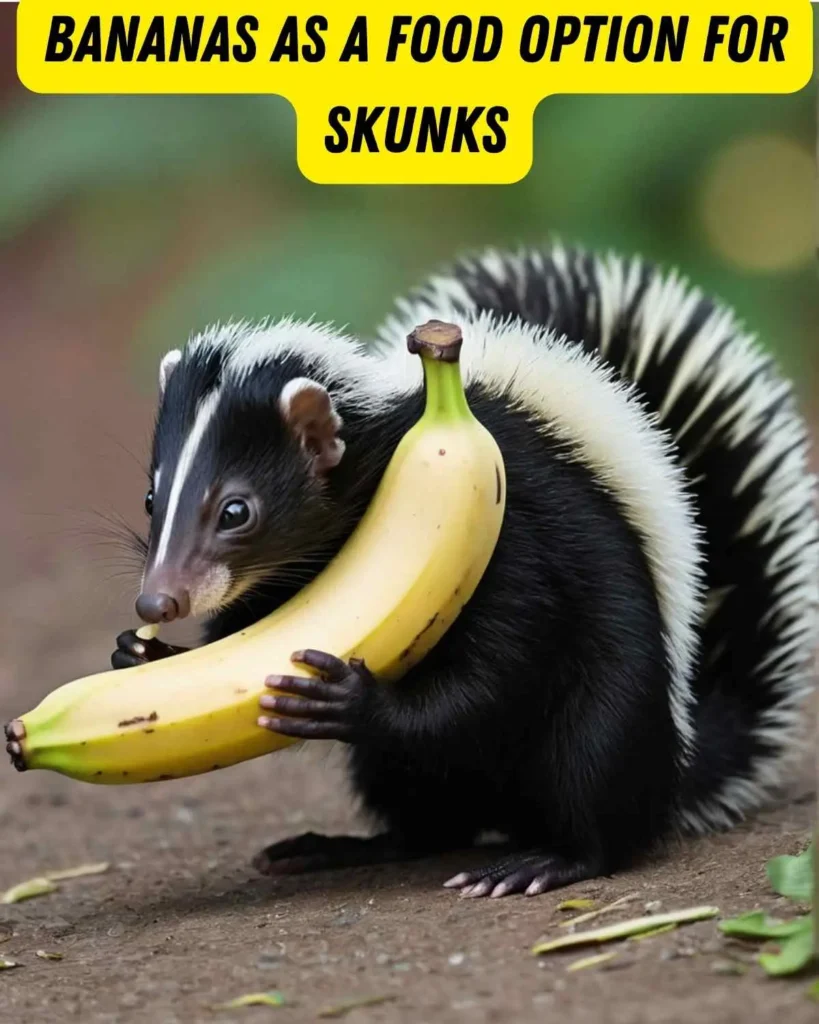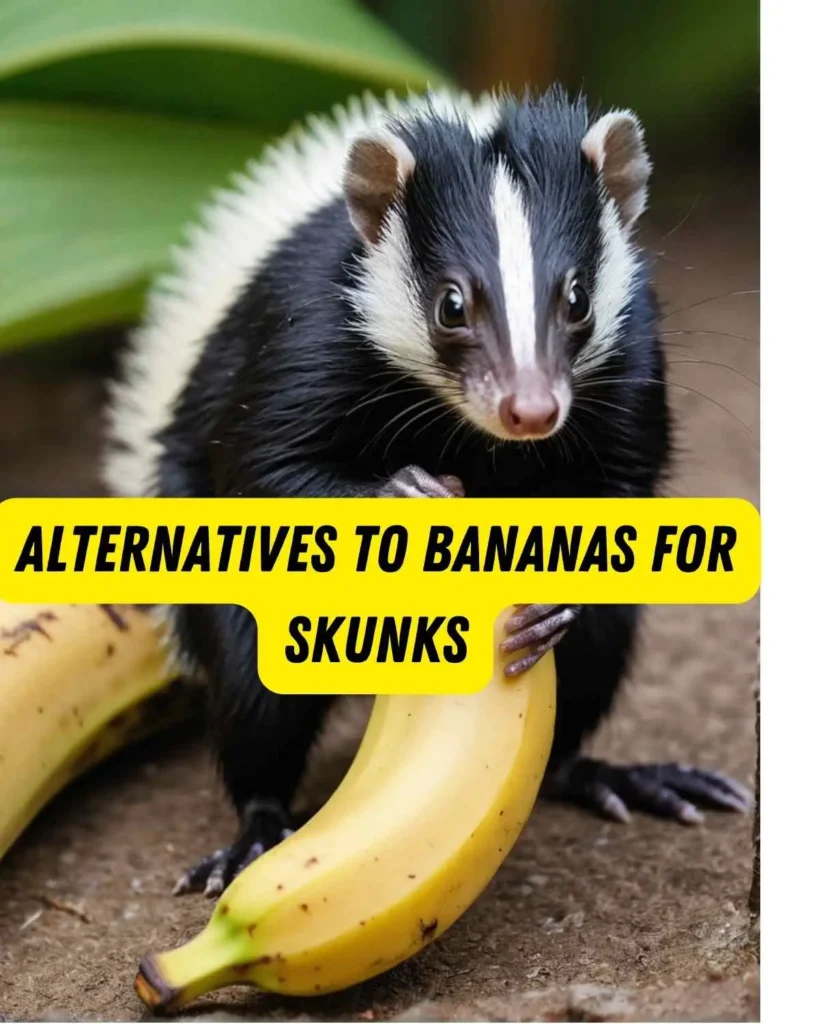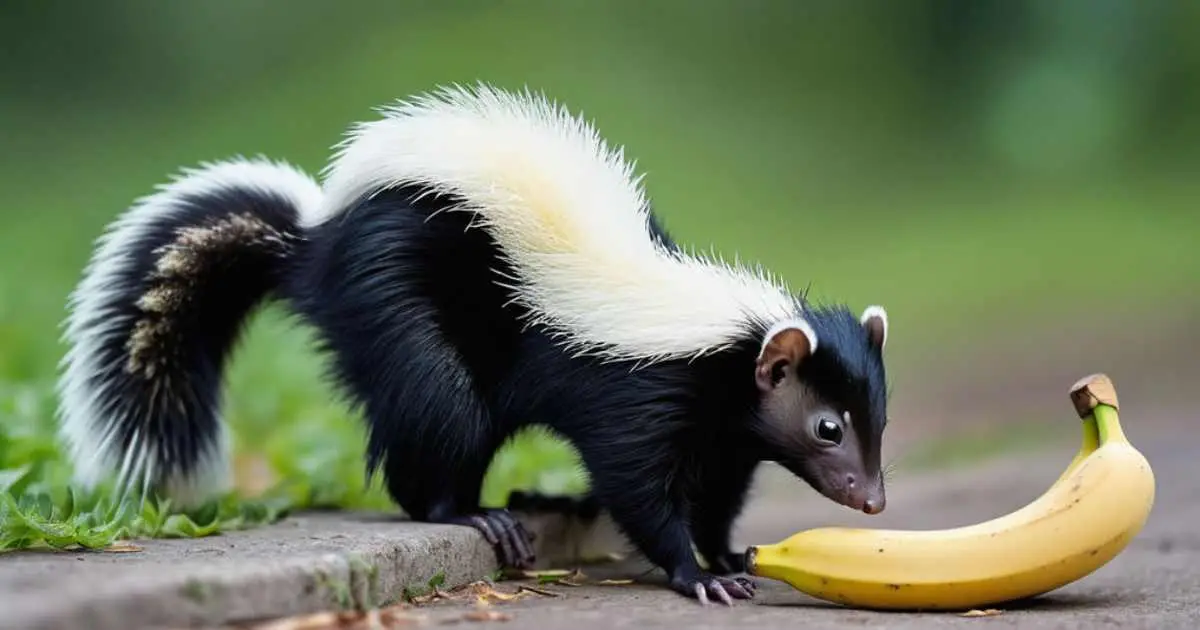Do Skunks Include Bananas in Their Diet?
Last updated on November 4th, 2024 at 06:51 am
Surprised that skunks might eat bananas? I was too! As a skunk pet owner, I found out that while bananas aren’t a big part of their diet, skunks will eat them if they find them. They usually prefer insects and plants, but their adaptable nature means they can enjoy different foods. Read on to learn all about what makes skunks such versatile eaters.
The Appeal Of Fruits To Skunks
Imagine a skunk foraging in your backyard. Beyond the infamous spray, skunks have a secret – they love fruits! Given their varied palate, sweet and juicy fruits like bananas are a favorite. Why do skunks find fruits so appealing? It’s a delightful mix of natural sugars, essential nutrients, and the pure enjoyment of diverse textures and flavors.
Natural Sugar Sources: Fruits In Skunks’ Nutrition
Fruits serve as a powerhouse of energy for skunks. These nocturnal creatures require a diet rich in calories for their nightly endeavors. Fruits, loaded with natural sugars, provide this vital energy boost. Skunks enjoy seasonal fruits that offer them not just energy but also hydration. Bananas, with their high sugar content, are particularly attractive to skunks.
- Fruits are instant energy boosters
- Provide hydration alongside nutrients
- Can supplement their protein-rich diet
Variety In Diet: How Fruits Fit In
Skunks are omnivores with a diet that includes insects, small mammals, and fruits. Fruits add necessary variety to their nutrition, supplying vitamins and aiding digestion. Bananas and other fruits are not the main course but an essential part of their diverse menu. They indulge in fruits for enjoyment and the benefits they bring to their overall health.
| Fruit Types | Benefits to Skunks |
|---|---|
| Berries | Antioxidants, fiber, easy to find |
| Bananas | Potassium, energy-rich sugars |
| Apples | Fiber, vitamins, hydration |
fruits like bananas play a crucial role in a skunk’s diet. They are attracted to the sweet flavors and the energy fruits provide. A skunk’s enjoyment of fruits reflects their need for a balanced and varied diet.
Bananas As A Food Option For Skunks
Consider bananas as a quirky treat for your friendly neighborhood skunks. These mammals are known for their diverse diet. Many skunk owners and wildlife enthusiasts often wonder: can these black and white creatures enjoy the sweet taste of bananas? The answer might be yes, but it’s essential to delve into the specifics of skunk dietary needs before peeling a banana for your striped friend.

Feeding Bananas To Skunks: Yay Or Nay?
Skunks are omnivores with a natural inclination towards varied foods. Bananas can be an interesting addition to their meal plan. Rich in nutrients, bananas offer energy and essential vitamins. Still, moderation is key. Here’s a basic guide on safely incorporating bananas into a skunk’s diet:
- Introduce bananas slowly to gauge tolerance.
- Serve small banana pieces to prevent choking.
- Limit portions to avoid digestive upset.
Potential Risks And Benefits Of Bananas
| Benefits | Risks |
|---|---|
| High in potassium | Excess sugar content |
| Source of vitamin C | Potential for obesity |
| Provides dietary fiber | May cause diarrhea if overfed |
Bananas can be a tasty treat that provides hydration and nutrition when given correctly to skunks. While they offer beneficial elements like potassium and fiber, the trick is to maintain a balanced diet. Always consider a skunk’s overall health and the risk of excess sugar. Remember, bananas should only be a small part of what a skunk eats.
Can Skunks Digest Bananas?
Imagine a skunk wandering into your backyard and stumbling upon a banana peel. The scene may seem unusual, but it piques my curiosity about these striped creatures’ diets. Skunks are known for their varied eating habits, but can they handle a banana?
Understanding Skunks’ Digestive Capabilities
Skunks are omnivores, meaning they eat both plants and animals. They have digestive systems that allow them to process a variety of foods, much like humans. Fruit, therefore, is not strange to their diet. However, not all fruits are created equal in terms of how easily they can be digested.
- Protein and fat from animals: Easy for skunks
- Insects and larvae: Natural part of their diet
- Grains and nuts: Consumed but in moderation
- Fruits: Generally digestible
Bananas And Their Digestibility For Mesomammals
Bananas, soft and rich in nutrients, provide quick energy for animals that consume them. Their texture makes them easy to eat and digest. Skunks, with their versatile diet, fall into the group of mesomammals.
| Banana Component | Skunk Digestive Response |
|---|---|
| Fiber | Helps digestion |
| Potassium | Good for muscle health |
| Natural Sugars | Energy boost |
| Soft Texture | Easy to chew and digest |
Mesomammals like skunks digest bananas fairly well due to their omnivorous diets. These fruits don’t cause issues unless consumed in massive quantities. They provide a balanced mix of vitamins, minerals, and hydration.
- Chop or mash bananas to aid skunk consumption.
- Introduce bananas into the diet slowly.
- Ensure bananas are ripe and free of pesticides.
Bananas are a safe snack for skunks, just not a staple in their diet. Always offer a balanced diet with a variety of foods.
Wild Skunks Vs. Domesticated Skunks
When we think about skunks, we picture them in the wild, with diets full of what nature offers. But what happens when skunks become domesticated? Their eating habits can change quite a bit. With human interaction, skunks’ diets may include foods not typically found in their natural environment, such as bananas. Let’s explore how their diets differ.
Diet Differences In Captivity
Domesticated skunks often eat different foods than their wild relatives. In captivity, skunks might be given:
- Dog or cat food, as a protein source
- Fruits like bananas, occasionally
- Vegetables, to mimic wild greens
Care must be taken to balance their diet. A responsible skunk owner will seek guidance from a vet.
The Impact Of Human Foods On Skunks
Feeding skunks human food can lead to health issues. Bananas, while safe in moderation, are high in sugar. Here’s how human foods like bananas can impact skunks:
- Excess weight gain
- Dental problems
- Nutritional imbalances
Thus, treats should be given sparingly and the diet should be well-rounded.
Feeding Practices For Skunks
Curious about what to feed your pet skunk? You’re not alone. Skunk owners often wonder about the ideal diet for their furry companions. Understanding what skunks eat in the wild provides a good foundation. From there, domestic feeding practices can ensure your skunk remains healthy and happy. Skunks are omnivores, which means they eat both plants and animals. While their diet can include a variety of foods, it’s essential to know which are beneficial and which could be harmful.
Best Practices For A Healthy Skunk Diet
A balanced diet is crucial for your skunk’s health. Veterinarians recommend a mix of proteins, vegetables, and fruits. Protein should come from cooked lean meats, eggs, and high-quality cat food. Vegetables should be fresh, and fruits should be given in moderation due to their high sugar content. It’s vital to provide a variety of foods to prevent nutritional deficiencies.
- Avoid sugary, fatty, and processed foods.
- Ensure fresh water is always available.
- Incorporate supplements if recommended by a vet.
Using Fruits As Treats: Dos And Don’ts
Fruits can be a delightful treat for skunks but should be given sparingly. Regulate the portion of sweet fruits, like bananas, to prevent obesity and diabetes. A small slice of banana can be offered as a treat, but not as a regular part of the diet.
| Do | Don’t |
|---|---|
| Offer fruits in small quantities | Replace meals with fruits |
| Choose organic when possible | Give fruits with pits or seeds |
| Wash fruits thoroughly | Overlook the skunk’s weight |
Nutritional Concerns For Skunks
Skunks, with their distinctive stripes and infamous defense mechanisms, also have specific dietary needs. While bananas can be a treat, an appropriate diet is vital.
Skunks are omnivores, meaning they enjoy both plant and animal foods. Bananas can be part of their diet, but balance is key. We delve into what makes a diet healthful for a skunk.
Balancing Macronutrients And Micronutrients
Macronutrients like proteins, fats, and carbohydrates provide energy and are essential for skunks. Bananas are rich in carbohydrates and can be a good energy source when fed in moderation.
Micronutrients, which include vitamins and minerals, are just as crucial. Skunks need them for proper bodily functions. Bananas offer vitamins C, B6, and potassium, but feeding a variety should ensure a well-rounded intake.
- Proteins – Vital for growth and repair.
- Fats – Essential for energy and cell functioning.
- Carbohydrates – A primary energy source.
- Vitamins and minerals – required for overall health.
The Role Of Veterinarian Guidance In Feeding Skunks
Consulting a veterinarian is critical for a balanced skunk diet. Professionals can provide tailored advice to ensure all nutritional needs are met.
An expert can guide portion sizes and frequency of treats like bananas. This guidance helps prevent obesity and deficiencies. Let’s keep our masked friends healthy and happy!
| Treat | Benefit | Recommended Amount |
|---|---|---|
| Bananas | Potassium, Vitamins | Small Portions |
| Proteins (Eggs, Chicken) | Build Muscle | As Main Diet |
| Vegetables | Fiber, Vitamins | Vary Daily |
Alternatives To Bananas For Skunks
Skunks enjoy a variety of foods, and while bananas can be part of their diet, it’s crucial to explore other nutritious offerings. Introducing alternatives to bananas can contribute to a balanced diet for your furry friends. Diverse options ensure that skunks receive all the necessary vitamins and minerals for their health.

Other Fruit Options And Their Benefits
Skunks benefit from a wide array of fruits.
- Apples – Packed with fiber for digestive health.
- Berries – Full of antioxidants; including strawberries, blueberries, and raspberries.
- Melons – Hydrating and vitamin-rich; ideal for water balance.
- Pears – Gentle on the stomach and low in calories.
Each fruit contributes to your skunk’s healthy life in unique ways.
Ensuring Dietary Variety For Skunks
Varied diets prevent nutritional deficiencies in skunks.
| Food Type | Benefits |
|---|---|
| Vegetables | A source of essential minerals and fibers. |
| Protein | Crucial for muscle growth and repair. |
| Insects | Provide natural foraging activity and nutrition. |
| Eggs | An excellent source of vitamins and protein. |
Combining different food types is vital for a skunk’s health.
Myths And Realities
Ever wondered what’s true about skunks’ diets? Some say skunks love bananas. Others think not. This post explores the ‘Myths and Realities’ around skunks eating bananas.
Debunking Skunk Feeding Misconceptions
Common myths can lead us astray. One suggests skunks eat only insects. Another claims skunks can’t resist bananas. But what do skunks really eat?
Skunks are opportunistic eaters. Their diet is more than just bugs. They munch on various foods, from plants to small animals. But bananas? Not a natural choice.
Real-life Observations Of Skunks Eating Habits
Real observations give us clear evidence. Skunks have been spotted in gardens and trash. They sometimes eat fruits, such as bananas, which are fruits.
- Fruit in their diet? Yes, occasionally.
- Are bananas on the menu? It depends.
- Is it their favorite? Probably not.
Skunks in captivity might eat bananas. It’s because humans feed them. Still, it’s not their go-to snack in the wild.
These striped creatures prefer easier-to-find food. They eat what’s available. In the forest, that’s usually not bananas.
Frequently Asked Questions
Chocolate, caffeinated beverages, and dairy products are toxic to skunks. Avoid feeding them onions, garlic, and salty foods as well.
Skunks often enjoy a variety of fruits, with berries, such as blueberries and cherries, being among their favorites. They are also known to eat apples and bananas.
Wild skunks can be fed cat food, fruits, vegetables, and cooked grains. Avoid feeding them spicy or sugary human foods. Always ensure food is fresh and provide clean water.
Conclusion
To summarize, skunks have diverse diets but bananas aren’t a natural choice. While they might nibble on bananas if available, these fruits aren’t typical skunk fare. Remember, offering wild animals human food can disrupt their nutrition. Let skunks forage for their intended wild diet.
Keep bananas for your smoothies, not your backyard visitors.

